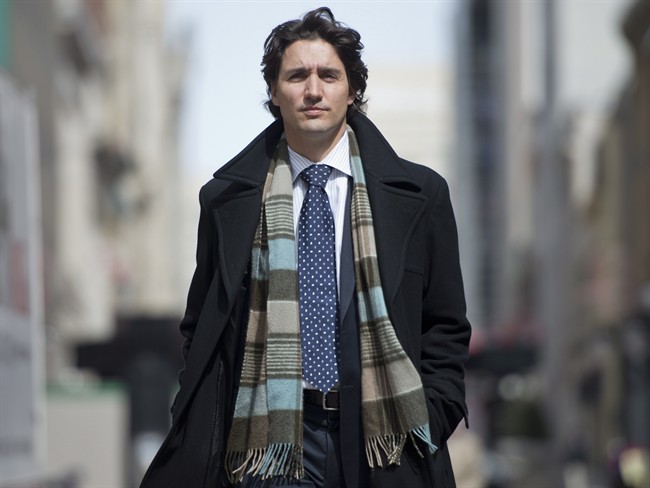OTTAWA – In an era in which parties stockpile dirt on one another in the political equivalent of mutually assured destruction, Justin Trudeau admits he’s taking a gamble by offering to unilaterally disarm.

But the Liberal leadership front-runner is betting Canadians would rather have a leader who sticks resolutely to the high road than another purveyor of negative attacks ads and the other dark arts of modern politics — like exploiting wedge issues and regional divisions.
“You’re absolutely right, it’s a bit of a gamble I’m taking,” Trudeau said during a wide-ranging interview with The Canadian Press.
The former school teacher said the choice before him reminds him of what he used to tell students about the Cold War.
“You point a gun at someone’s head and they point a gun back at you, and you’ve got a room full of people watching, you’ve only got two ways out of it. Either one of you pulls the trigger … or else one of you chooses to put the gun down and say, ‘Well, if you’re going to shoot me, you’re going to shoot me unarmed in front of all these people.’
“And I like to believe that Canadians will respond to the latter.”
The Montreal MP, eldest son of former prime minister Pierre Trudeau, is expected to handily secure the leadership Sunday. He fully expects he’ll quickly face a barrage of Conservative attack ads, similar to the ones that so effectively trashed the party’s past two leaders, Stephane Dion and Michael Ignatieff.
“The Conservatives are going to attack because that’s what they do. This is the one way they know how to do politics and they’re better at it than anyone else,” Trudeau said.
- ‘Shock and disbelief’ after Manitoba school trustee’s Indigenous comments
- Canadian man dies during Texas Ironman event. His widow wants answers as to why
- Several baby products have been recalled by Health Canada. Here’s the list
- ‘Sciatica was gone’: hospital performs robot-assisted spinal surgery in Canadian first
While he’s vowing to remain resolutely positive, Trudeau stressed he’s no naive Boy Scout; he doesn’t intend to simply let attacks go unanswered.
“We’re working on trying to figure out how to respond in way that’s strong enough for Canadians to see that I won’t be pushed around but not based around attacks and negativity,” he said.
“I’m not going to sit back but I’m also not going to be dragged down to the same level as they are because across the country I have seen Canadians sick and tired of the negativity and the fighting.”
But it’s not just attack ads Trudeau is promising to eschew. He’s rejecting the entire thesis that successful political marketing means identifying potential supporters and then targeting those sympathetic segments of the population with messages tailored specifically to their concerns.
The Conservatives have used that approach successfully in Canada, as have Democrats in the United States to elect President Barack Obama.
Trudeau acknowledged that “micro-targeting” of voters is “an extremely effective way of doing politics.”
But he contended it’s a negative approach in a country as diverse as Canada. And, as practiced by Prime Minister Stephen Harper and NDP Leader Tom Mulcair, he maintained it has exacerbated regional, linguistic, cultural and religious tensions and ultimately made Canada harder to govern.
“You can get elected through the politics of negativity and division. You just can’t govern worth a damn because you’ve gone and turned people away from the kind of active, engaged citizenship that is the source of any solution, any meaningful incremental change … And I refuse to win in such a way that would hamper my ability to govern responsibly for the entire country.”
Trudeau believes it’s still possible to make a mass, pan-Canadian sales pitch to a broad range of voters right across the country, appealing to their shared values and common goals.
Taking such a pan-Canadian approach is “a gamble that says, no, I’m not going to engage in the kind of divisive, negative attacks that Mr. Harper is capable of. No, I’m not going to play up resentment against the successful like Mr. Mulcair is doing,” Trudeau said.
It’s also, he added, the only approach that justifies asking his young family to make the sacrifices he knows are in store should he become leader.
“It only is worth it if I’m actually serious about doing right, not just doing well.”
Should he win the leadership, as expected, Trudeau said his biggest immediate challenge will be overcoming Canadians’ cynicism about politicians.
“Before we can present a robust vision for the future and a slate of ideas on how to get there, we actually have to remind Canadians that politics is supposed to be in the vision-building, it’s supposed to be in the big ideas, in strong challenges and problem-solving mode.”
Trudeau also acknowledged that rebuilding the party, particularly in his home province of Quebec where the party needs to build “from scratch” in many ridings, will be another big challenge.



Comments